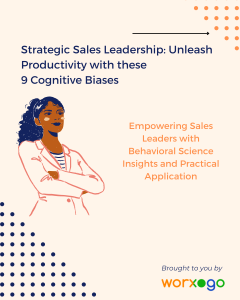
Download the free mini-guide on 9 cognitive biases here – get a brief overview on each bias and how to use them to build a more engaged, motivated and productive team.
Biases for Sales Leaders
People are actually quite irrational in their choices and decisions. We like to think that we take in all the information and make accurate judgements based on the information. But this is actually not the case. In fact, there are a range of biases that impact the way we decide, often completely ignoring the information available to us. The reason we do this is because these biases act as mental shortcuts. Usually these mental shortcuts serve us well, helping us make quick decisions. Sometimes these mental shortcuts lead us to act in ways that are not beneficial to us.
At workplaces, biased decisions can demotivate teams and build a culture of disengagement and lack of productivity. They can also lead to faulty leadership decisions.
That’s why it’s important to be aware of the cognitive biases leaders and their teams are prone to and take steps to proactively create an environment for better decision making.
We’ve taken a deep dive into 9 Behavior Biases that impact sales teams and sales leaders in particular. In this guide, you’ll learn what these biases are and how they can be used to the workplace.
The downloadable guide is meant to be more of a reminder of these biases to be saved on your desktop for quick reference.
For detailed explanations on each of the 9 biases do check out the blog links below:
Download your free mini-guide now: The 9 Cognitive Biases that stop you from being an effective leader


